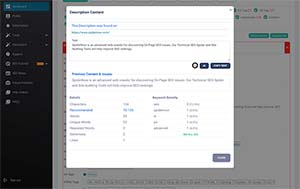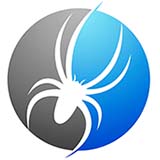The Importance of Page Titles and Meta Data
Content play a pivotal role in determining a website's visibility in search engine results pages (SERPs)

Analyzing Page Titles and Meta Data
Page titles and meta data are fundamental elements in the realm of search engine optimization (SEO). While they may appear small in the grand scheme of web content, they play an enormous role in determining a website's visibility in search engine results pages (SERPs) and influencing user click-through rates (CTR).Page titles, often referred to as title tags, are the initial point of contact between a webpage and a user seeking information online. They are prominently displayed on SERPs, acting as the headline for a search result, and they serve as the entry point for users to decide which link to click on. Hence, the importance of crafting a compelling page title cannot be overstated.
From an SEO perspective, page titles are of paramount significance. They function as one of the primary signals used by search engines to gauge a webpage's content and relevance to specific search queries. A well-optimized page title can significantly boost a website's ranking for targeted keywords and phrases.
Improving website's title tag
To understand how to create an effective page title, one must break down its components. A typical page title consists of several key elements, including the primary keyword, a concise description of the page's content, and occasionally, the brand name.The primary keyword should be strategically positioned near the beginning of the page title. This keyword represents the central theme or topic of the page and holds great significance for SEO. Including the target keyword helps search engines grasp the page's relevance to specific search queries.
Beyond the keyword, the page title should provide a brief yet engaging description of the page's content. It must captivate users, promising valuable information or solutions to their inquiries. Additionally, if the webpage belongs to a brand or organization, it is often wise to include the brand name at the end of the page title. This promotes branding and recognition, but it should not overshadow the primary keyword and description.
For instance, consider a webpage offering "10 Tips for Healthy Eating" from a website named "NutriWell." An effective page title could read: "10 Tips for Healthy Eating | NutriWell - Your Guide to Nutrition." In this example, "10 Tips for Healthy Eating" is the primary keyword and description, while "NutriWell" functions as the brand name.
While page titles are crucial for capturing user attention in search results, meta descriptions serve as brief summaries of a webpage's content. Although they do not have a direct impact on search engine rankings, they play a pivotal role in enticing users to click on a particular link.
Creating your meta description
Think of the meta description as an advertisement for your webpage. It should complement the page title by expanding upon the promise made in the title, offering a glimpse into what users can expect to find on the page. Well-crafted meta descriptions can significantly enhance CTR by enticing users to click on your link instead of others in the search results.Creating compelling meta descriptions involves a delicate balance between conciseness and informativeness. Several key elements should be considered:
Ensure that the meta description directly relates to the webpage's content and aligns with the user's search intent. Irrelevant or misleading descriptions can lead to high bounce rates, harming your website's overall performance.
Use persuasive language to engage users and encourage them to click through. Highlight the value or benefits of visiting your page, making it clear why your content is worth their time.
While not as critical as in page titles, incorporating relevant keywords into the meta description can reinforce the page's relevance to search engines.
Be mindful of character limits. Search engines may truncate meta descriptions if they exceed a certain character count. Aim for concise yet informative descriptions within the recommended limit, typically around 150-160 characters.
For instance, continuing with the previous example of the "10 Tips for Healthy Eating" webpage, a suitable meta description could be: "Discover the secrets to a healthier lifestyle with our expert tips on nutrition and wellness. Start your journey to a better you today!"
Optimizing page titles and meta descriptions for SEO is a multifaceted endeavor. To improve your website's search engine visibility and user engagement, you should follow best practices in their creation and management.
Before crafting page titles and meta descriptions, comprehensive keyword research is essential. Identifying relevant and high-traffic keywords in your niche is the foundation of effective optimization. Select primary and secondary keywords to target in your content.
Each page on your website should boast a unique page title and meta description that accurately represents its content. Avoid duplicate titles and descriptions, as they can confuse both users and search engines, potentially leading to lower rankings.
While it's crucial to include your target keyword, refrain from overloading your titles and descriptions with keywords. Strive to keep the content natural and user-friendly, ensuring that it reads well and entices users.
Given the growing prevalence of mobile devices for web browsing, it's essential to optimize your page titles and meta descriptions for mobile display. Keep them concise to avoid truncation on small screens, delivering a seamless user experience across all devices.
Consider employing schema markup, a structured data format that can enhance the appearance of your search results in SERPs. Utilize relevant schema markup to provide additional context and information about your webpage, potentially making it more appealing to users.
Increase SEO rankings
SEO is an ongoing process, and maintaining a strong online presence requires regularly reviewing and updating page titles and meta descriptions. Keep them aligned with current search trends and user preferences to ensure that your content remains relevant and competitive.Monitoring the performance of your page titles and meta descriptions is essential. Utilize analytics tools to track CTR and user engagement. Conduct tests to determine which variations yield the best results and adjust your optimization strategies accordingly.
Page titles and meta descriptions are often overlooked but crucial components of SEO. They serve as the gateway between users and your website's content, influencing click-through rates and search engine rankings. Crafting effective page titles and meta descriptions requires a deep understanding of your target audience, thorough keyword research, and creative skills to entice users.
As search engines evolve and user behaviors change, staying ahead in the SEO game necessitates adapting your page titles and meta descriptions accordingly. Regularly reviewing and optimizing these elements is vital to maintaining a strong online presence and attracting the right audience to your website. Remember that SEO is dynamic, and mastering it can lead to increased organic traffic and improved conversion rates for your online endeavors.
The above information is a brief explanation of this technique. To learn more about how we can help your company improve its rankings in the SERPs, contact our team below.

Bryan Williamson
Web Developer & Digital Marketer

Web Developer & Digital Marketer
Digital Marketer and Web Developer focusing on Technical SEO and Website Audits. I spent the past 26 years of my life improving my skillset primarily in Organic SEO and enjoy coming up with new innovative ideas for the industry.













